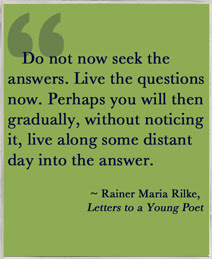The Spiritual Discipline of Skepticism

“Trust the science.”
It’s a phrase on many lips these days, as the United States recovers from a presidency notorious for basing public policy and pandemic strategy on lies and hearsay. It is a huge relief to have national leadership that takes science seriously again. The health of Americans, of humanity as a whole, and of the planet depends on it.
The problem with the phrase is that science is not about trusting science. On the contrary.
Science is the disciplined distrust of science.
Theories arise to explain phenomena, based on evidence. Scientists question the theories and the evidence, perhaps posing alternative theories. Over time, in this process of organized skepticism, a scientific consensus often emerges – a theory that works, at least for the time being – providing a scaffold for further scientific inquiry and progress. That progress may result in new evidence and insights that could undermine the consensus and lead to a new theory that accounts for a broader base of evidence, around which a new consensus can form.
In contrast to this process, disorganized skepticism of science is a mounting threat. Anti-vaxxers cling to disconnected shreds of evidence and discredited theories that confirm their convictions. The same applies to climate-change deniers. And to 6-day-creationists and “intelligent design” advocates.
These are literally unhealthy forms of skepticism. The healthy version is called science.
There are many questions that mainstream science can’t answer, at least at the moment. Ethical and moral questions, such as: who should get the Covid vaccine first? And how can such a prioritization be made understandable and acceptable to the public? Science provides data upon which such judgments can be made, but ultimately we can’t trust science itself to sort them out. The scientific consensus is overwhelming that humans are causing catastrophic climate change with CO2 and other greenhouse gas emissions. But scientists can’t tell us exactly what to do about this reality. Ethical and political calculations must be made that will rely on information from scientists, but are beyond their purview to decide.
In this fuzzier realm of ethics and values and public decision-making, skepticism has its place as well. In politics, questioning authority should not just be allowed, but required. Democracy at its best is disciplined, organized skepticism. Does this policy really distribute resources effectively and ethically? Or is another one better? Transparency is essential in government, in order to facilitate this kind of questioning.
And disciplined skepticism is necessary in religion, too. Not only to keep churches and their leaders honest, but to refine and deepen faith itself, examining doctrines and re-interpreting or releasing them if they no longer rise to the standard of Jesus’ simple law of love. Progressive Christianity is a form of the faith that never stops asking questions about the Christian tradition, because questioning is integral to our faith.
God is “agape” – unconditional love. And unconditional love is open, opinion-free attention. And open, opinion-free attention leads to questions. Kind but unabashed and unfettered questions. When we love others with such questions, we move deeper and deeper into the truth of each other’s hearts. This kind of love leads to transparency: “For now we see in a mirror, dimly, but then we shall see face to face…” (Paul, 1 Cor 13:12) All is revealed: our crowning glories, our failings, our frustrations, our hopes, our emotions — our highest yearnings, our greatest regrets. Like science, love is an endless process that leaves no stone unturned, no assumption unquestioned. Love is a disciplined, compassionate, gentle form of skepticism that always wants to see and know more. Love may reveal painful things, but it also assuages that pain. Thus love leads to spiritual and personal progress.
So may this kind of healthy skepticism flourish — in the realms of science and spirituality alike.

